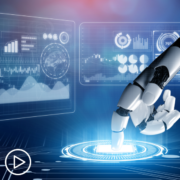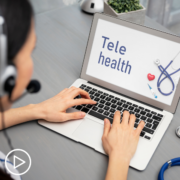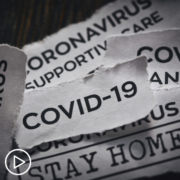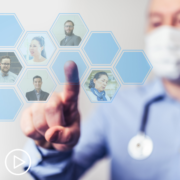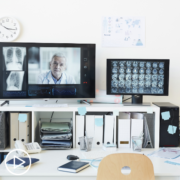How Is MPN Care Influenced by Technology (AI, CRISPR)? from Patient Empowerment Network on Vimeo.
How do CRISPR and artificial intelligence (AI) influence MPN care? Watch as experts Dr. Joseph Sirintrapun and Dr. Jeanne Palmer share their perspectives on how CRISPR and AI can impact MPN patient care and explain situations where AI performs above and below healthcare professionals.
Download Resource Guide
See More from MPN TelemEDucation
Related Resources:
Transcript:
Lisa Hatfield:
So in addition to the telemedicine technology, there are other types of technology that are influencing cancer care. Can you speak to some of those technologies? I know I’ve always been really interested in the CRISPR technology, which I don’t hear about as much anymore. Artificial intelligence, my oldest daughter is graduating from college this year. That’s what she’s studying. So can you touch on some of those technologies and how those are continuing to evolve also?
Dr. Sirintrapun:
Oh yeah, there’s a lot. So maybe as a disclaimer also, in addition to being an informaticist, I’m a pathologist. So it’s a great honor to speak in front of patients because many patients may not necessarily know whenever you get a diagnosis, there’s a pathologist who made the diagnosis on a glass slide through a lab test. So that’s my path as a pathologist. So a lot of my technology mindset is in terms of diagnostic. So how do you make the diagnosis better? And you mentioned about…well, I mean, we’ll start with CRISPR. CRISPR is not necessarily in the diagnostic front, but it’s a very exciting thing, especially for those tumors that have genetics. One of the simple genetics. You misplace one gene here, and all of a sudden it just alters the way one protein goes, and it leads to a disease, a cancer. And if you’re able to surgically or genetically microsurgery you can imagine the implications and the transformation for that.
We’re already looking at it with hereditary diseases like Huntington’s and some of the different blood disorders out there, which have like single genes or maybe a couple that you can just sort of pick out there. It’s still early. And that’s maybe the reason why you haven’t heard the technologies there that can do it. But how to deliver it, how to do the microsurgery. You can have the scalpel, but somebody has to hold the scalpel and how to do that in terms of what type of nanotechnology is out there, all these different things. But CRISPR is very exciting. I do expect over the next, definitely in the next couple of decades, you’ll see something, some brilliant application coming out of that.
Now you mentioned AI, that’s definitely down my wheelhouse because I implement a lot of…I see a lot of AI and I try to figure out different ways to implement the AI into healthcare. Because there’s tons of AI out there, but the idea is to basically use the right AI at the right time with the right person using it and for the right problem. And there’s a lot of rights in there and it sounds simple, but you have to keep in mind that in the AI world, we sort of separate AI into like general AI and narrow AI. General AI is kind of the, is what some people term the singularity. Like it knows everything. It can read your mind. You can switch the setting of whatever it is. It can write poetry in one setting, play the piano in another. There really is no such thing.
So if you hear ChatGPT, if you ask it to play the piano, it’s not quite applied for that. It’s really for language. And I try to illustrate that point because that…all these AI currently that’s out there is still in a narrow AI. It doesn’t do what a person does. As people, we can switch. We can task switch. We may not beat the robot, but we can certainly task, if the setting changes, we can adjust. And that’s the power with our intelligence. We’re generalized. While most AI is narrow, but very good. They can be…obviously, when IBM Watson beat everybody at Jeopardy, and now you hear ChatGPT beat people in passing the boards. So a lot of med students are going, oh my gosh. Keep in mind that it’s narrow. I mean, this is what the robot is really good at. They’re very good at facts. They’re good at other things. And you can use that. You can, but they’re not going to be able to task switch.
And they’re not going to be able to know when they need to deploy the right situation. Remember, they’re narrow. So they’re not going to know when you change a situation. It’s not going to know when to switch. That’s the job of a physician, maybe the patient. And it’s my job as kind of the engineer or an informaticist to figure out when those come in. When should it trigger at the right time? When to make sure that people don’t misuse it at the wrong time and deploy the right problem to the right AI. And so, for instance, as a pathologist, one of the big hottest things that we have right now is prostate biopsy. I deal with male cancer. So I deal a lot with prostate. But the AI is pretty good at actually even, I would argue, probably getting better at catching cancer in a small prostate biopsy than humans are. There’s small things that maybe, for whatever reason, human factors being tired, the AI can actually catch it quicker.
It might overflag. It might catch things that are not necessarily cancer. But it will catch it. It will catch it. And it can be very helpful. Because you can imagine as humans tire, they can use that to screen. It may not be perfect at diagnosing, but it can screen. And at least it won’t miss anything. And then the human, the pathologist who comes in, can go and say, I can confirm that that’s cancer or not. So you save a lot of mental power, mental energy in terms of things. And this is an application of AI helping providers, and I can see in the future even patients sort of answer questions that would have been very laborious, tedious. This goes back to the automation theme that we had earlier. How do we make things easier? How do we decrease the friction? I sort of illustrated a case where they had friction points and tiredness and things like that. And so these are things that are on the horizon.
And I think we’ll learn a lot in the next decade or so. You’ll see a lot pop up. You’ll probably see some mistakes too, people overusing it or being in the wrong situation. But that’s the way medicine works. Medicine works through some trial and error. You make your best guess. You have experts. But in the end, there’s a lot of unforeseen things. But you learn a lot along the way. And you learn when to use it. And eventually, you reach this equally important point where everything works very well. It’s part of the workflow. It’s just part of…you just expect it. It’s just when you go to care, you just expect that there is a human overseeing some AI that’s making sure that you’ve got the right diagnosis that nothing’s left out, nothing’s omitted, and you can trust it. That’s kind of the place you eventually end up being.
Lisa Hatfield:
Well, and you hit right on something that I think a lot of people worry about is how can we trust AI and all of the ethics surrounding that? Can we really trust AI? As a patient, I’m fascinated by that. And I know that the Cancer Moonshot Program has directed some funds to AI and cancer research. I look forward to the day when there’s a bridging of that gap between research and then clinical practice with humans involved in a lot of the decision-making along the way also. I’m not sure that we can ever move away from that. But that was a great overview of technology. I hope it continues to evolve. I hope what I’ve seen, what you talked about, you work more in solid tumors. I have a hematologic cancer myself. But I do see that there is some AI being used in earlier screening and also in the identifying of different genetic mutations within those cancers. So I look forward to that continuing to evolve.
Dr. Sirintrapun:
That reminds me, too, and I left that part out. Some of these technologies… I’m sorry I left that out, but genomics has become a big thing over the last decade because of the Cancer Genome Atlas and other things that actually allowed us to map the genome. But along that front, we have technologies that can monitor progression. So we can at the cellular level. If you’re actually circulating cell-free DNA as a technology that’s out there. Where if you can implement it correctly, you can actually follow the patients just through blood without anything invasive. And it’s much better than any imaging study out there. So there are technologies that are evolving on this. And because of all the progress we’ve made over the last 10 years, you can see that being incorporated in a clinical trial where you can monitor patients much better. You can intervene faster and more effectively and all those other things like that. And thanks for reminding me about that. I forgot to mention cell-free DNA is another one that I’m very excited about, still early.
Lisa Hatfield:
Yeah. Well, thanks for that information. Dr. Palmer, do you have anything to add to this informatics description or discussion?
Dr. Palmer:
Well, I think there’s a couple of things about the technology component of it. I know it was several years back, CRISPR, when it first came about. It’s a brilliant technology. Everyone got very excited. Okay, if you look at a lot of the myeloproliferative neoplasms, there’s three driver mutations that are really felt to contribute strongly to the development and the ongoing nature of the disease. Everyone said, oh, I can go in and if you take out that gene and replace it with the new one, I can fix it. I think that where the role of CRISPR right now is, is it’s doing amazing things to help us understand the biology of the disease.
I think in terms of treating a lot of the malignancies, they’re so genetically complex that even though we say, okay, well, you have, for example, a JAK2-positive essential thrombocythemia, which is JAK2 is one of the driver mutations and essential thrombocythemia is too many platelets. Unfortunately, I probably can’t go in there and get all the JAK2 mutations in the blood system to replace them. Now, where it is making huge strides is in things like sickle cell disease and thalassemia, where there is one gene that is a problem. And even if you only replace it in 50 percent of the cells, you can really drastically change somebody’s life. So I think that it is used in certain situations and is absolutely astounding and amazing. I think it’s utility and completely eradicating cancer is going to be something that is going to take a long time to come about. But I do acknowledge that it’s making enormous strides in understanding how everything can work, because you can quickly remove something, replace it with something else, and really understand what the function of that mutation or that gene happens to be. In terms of the artificial intelligence, I’m looking forward to seeing how it can be used.
I think it’s right. You try to find, how can I come up with the right answer? And once you think, oh, this should be easy, I should be able to look at somebody’s blood counts over the course of a year and be able to predict something. But to actually be able to do that, I think, is going to take a lot more thought. So it is something that I’m hopeful that we can all start to utilize more. I think the last thing is, is some of these really fancy ways of detecting minute amounts of diseases. I think circulating DNA, which I frankly don’t know a lot about, because I don’t treat a lot of solid tumors. But also, when I look at just bone marrow disorders, like acute leukemias, we often look for something called minimal residual disease, which is this below the microscopic level. You’re looking at like one cell out of 0.001% of the cells.
And honestly, we don’t really know how to deal with that. And I think sometimes it ends up providing more anxiety, because you have otherwise a disease that you would say, under all historical purposes, you’re in remission, this is great. And then you have this little amount of disease. And sometimes it’s good, because it can help us determine the next steps of therapy in a more effective way. But sometimes it just creates stress, and we don’t truly know the actual meaning of it.
Share Your Feedback:
Create your own user feedback survey

